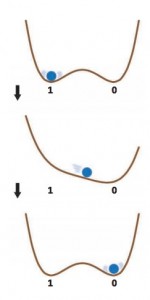Just as Google recently announced that it would cease its Google Reader operations on July first, I, too, have decided to streamline my activities. Well, just my blogging activities. I think, rather than keeping all of the subject matter separated into separate categories, ergo separate blogs, I would just merge them altogether on this one.
 |
| via the Sartorialist |
The fact that you have to perform work, thus, energy, to erase data is called Landauer’s erasure principle, proposed in 1961. It is valid for all cases except for when the data are highly related, statistically speaking. Although Landauer was referring to the classical physical world, my decision to erase my other blog was more philosophically taxing than heat-generating.
 |
| via Sciencemag.org |
They would move a bead back and forth, on a microscopic scale and using precise tools – not their hands – and measure the amount of dissipated heat each time the bead moved from 1 to 0. During some of their trials, they found that the operation released less energy than the minimum amount that Landauer predicted.
Their finding wasn’t published in a paper later on, but they did manage to have their experimental set-up accepted by the American Physical Society’s journal Physical Review E. Ostensibly, the finding they presented at that meeting wasn’t so well received by their peers. As such, Landauer’s principle, with his original predictions, still holds up in the scientific world, except for when quantum phenomena are observed.
No matter how you look at it, destroying data does require work. The exceptions would be if I ever find myself so correlated with my blog subjects so as to exclude me from Landauer’s erasure principle or if my thoughts obeyed the laws of quantum physics. But that would never happen. I blog because I can ruminate about those things that pop into my head right before I go to sleep, those things that make me think, “What if?” And isn’t that everything?
———————————————————————————————————————————-
Rio L.D., Åberg J., Renner R., Dahlsten O. & Vedral V. (2011). The thermodynamic meaning of negative entropy, Nature, 476 (7361) 476-476. DOI: 10.1038/nature10395
Jun Y. & Bechhoefer J. (2012). Virtual potentials for feedback traps, Physical Review E, 86 (6) DOI: 10.1103/PhysRevE.86.061106